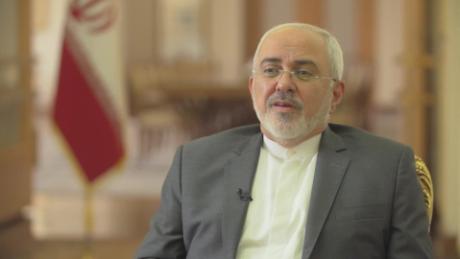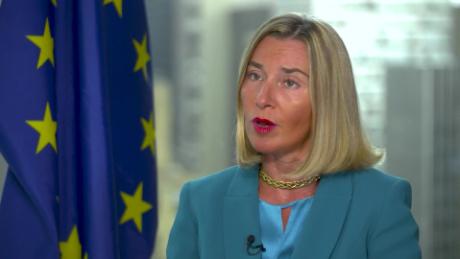Brussels, Belgium (CNN)Three years ago last week, the Iran nuclear deal came into effect, limiting the country's nuclear program in return for sanctions relief. But in the wake of the Trump administration's withdrawal from the agreement, and with relations between the European Union and Iran declining sharply, there is growing doubt it will see its fourth birthday.
The Europeans and Iran are at odds on a range of issues: Iran's ballistic missile program, attacks and plots against Iranian dissidents in Europe and slow progress towarda relieving the effects of US sanctions.
A meeting earlier this month between several European diplomats and the Iranian Deputy Foreign Minister, Seyed Abbas Araqchi, is reported to have ended in acrimony. Iranian news agency Entekhab, citing anonymous sources, says Araqchi rejected European complaints about the missile program and plots against Iranian dissidents.
Entekhab quoted Araqchi as telling the meeting: "I thought you have come here to talk about your laxity regarding the JCPOA [Joint Comprehensive Plan of Action] and terrorists who you have sheltered in Europe and make apologies."
The agency reports that he then walked out, saying: "The meeting is finished."
Iran's Foreign Ministry has not confirmed details of the meeting.
Several European countries have alleged that Iran's security services have plotted to assassinate dissidents in Europe.
In October, Denmark accused Iranian agents of attempting to carry out a plot to assassinate an Iranian-Arab opposition figure on Danish soil.
On the same day as the ill-fated Tehran meeting, the Netherlands blamed Iran for two killings on its soil in 2015 and 2017. The same day, the EU designated the Iranian Intelligence Ministry as a terror organization. It was a shot across the bow rather than a punitive measure.
One European Union source told CNN the Iranians must put a stop to attacks in Europe. "We hope they sort it out and don't shoot themselves in the foot," he said. "If I were Iran I would look around and see that Europe is my best friend in a very volatile world."
However, the same source cautioned: "The main difficulty with Iran is that there are many Irans."
"We are working with the part of Iran that wants to save the [nuclear deal]. There are many other layers of the onion called Iran," the source said.
"There are growing reasons of concern, including Iran's destabilizing role in the region -- especially in Syria by supporting non-state actors," another EU source said.
On Monday, Germany banned the Iranian airline Mahan Air because of its alleged involvement in shipping supplies to the Syrian regime, saying it would "not allow air traffic to Germany by companies which support the war in Syria and aid to suppress people in war zones."
Starved of cash
Iran has its complaints, too. The Europeans promised a financial mechanism to help Iran cope with the impact of US sanctions. Known as the "Special Purpose Vehicle," it would provide Iran with access to the international financial system to help it import basic goods. The collapse of the Iranian rial has led to widespread shortages in Iran, including of medical supplies and equipment.
The SPV was first proposed in September but has yet to see the light of day. A European official told CNN on Tuesday that creating the SPV "is in its final stages" and the aim is to have it up and running by the end of this month. But the official said it was not yet clear which Iranian bank would be its partner.
There are doubts within the Iranian hierarchy over whether the Europeans will deliver. Ahmad Jannati, the powerful Chairman of the Guardian Council, said last week that "being hopeful that the Europeans will abide by their JCPOA obligations is stupidity," adding: "They are dragging their feet and will never do anything in our favor."
Another leading official, Kamal Kharrazi -- head of Iran's Strategic Council on Foreign Relations -- complained that European governments were not encouraging leading companies to do business with Iran.
Many larger European companies have already cut back or eliminated business links with Iran, fearing they could become targets for US sanctions.
"If you are the CEO of a European company and you are given the choice between doing business in the United States market or the Iranian market, that is the fastest decision you will ever make as CEO," a senior State Department official warned last month.
The official also said Washington expected Europe to impose new sanctions on Iran because of its ballistic missile program, saying recent missile tests were "not defensive in nature" and that Iran had launched missiles "capable of carrying multiple warheads including a nuclear weapon."
Iran tested a medium-range ballistic missile in December, prompting accusations from the US that such actions were in defiance of UN Security Council resolutions.
The Trump administration is expected to intensify pressure on Europe at a summit on Middle East security scheduled for Warsaw in February, and the Europeans are scrambling to solidify their policy before then. As one European diplomat put it to CNN: there's "still quite a bit of diplomatic activity and time is running out."
Not dead yet
There are plenty of reasons for Iran to remain in the nuclear deal, despite two harsh rounds of sanctions imposed on its financial institutions and oil exports by the US last August and November.
US President Donald Trump had threatened to reduce Iranian oil exports to zero but his administration has since granted waivers to a number of buyers, including Japan, Turkey and South Korea. Iran is still exporting more than one million barrels a day, according to industry sources.
Much of that oil goes to Asia -- but were Iran to withdraw from the JCPOA, the market demand would likely shrink, and fast. "Among Iran's top buyers, Japan and South Korea would be the most likely to halt purchases if Iran stopped complying with the deal," Henry Rome writes in Foreign Affairs.
In May, the Trump administration will decide whether to renew the waivers that allow Iran to export some oil. That may be a turning point, Rome said. "Washington is confident that with increased global oil supply, combined with slowing international demand, the US will have the leverage to further depress Iranian exports."
That would make it harder for Europe, China and Russia -- the other signatories to the JCPOA -- to keep the deal alive. Without substantial help, Iran may feel it has nothing to gain by continuing to endure both onerous sanctions and a freeze of its nuclear program.









